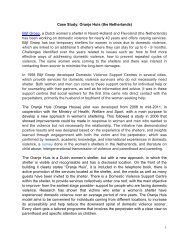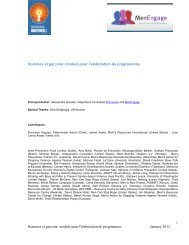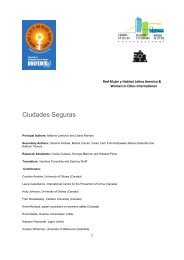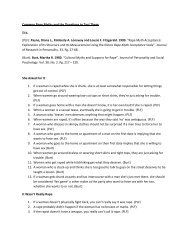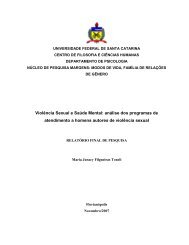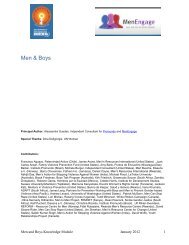Campaigns to End Violence against Women and Girls - Virtual ...
Campaigns to End Violence against Women and Girls - Virtual ...
Campaigns to End Violence against Women and Girls - Virtual ...
You also want an ePaper? Increase the reach of your titles
YUMPU automatically turns print PDFs into web optimized ePapers that Google loves.
she reaches the age of 18, explaining <strong>to</strong> him that such practice is outlawed by the<br />
amended moudawana. An evaluation concluded that the PSAs which were closest <strong>to</strong><br />
the viewers’ own life experience effectively raised awareness on the law (Anaruz/LMS-<br />
CSA, 2007).<br />
Read about the <strong>to</strong>ols used in the media campaign (in French).<br />
� On what theory of change is the campaign based? Effective behaviourchange<br />
campaigns are based on theories of change, which focus on different<br />
drivers of behaviour-change. For example, if the campaign is based on the stages<br />
of change theory, messages should encourage people <strong>to</strong> reflect on their thinking<br />
<strong>and</strong> behaviour, <strong>and</strong> <strong>to</strong> devise their own ways of ending VAW in their lives. In a<br />
health belief model, it is appropriate <strong>to</strong> show the risks <strong>and</strong> dangers VAW presents<br />
<strong>to</strong> the target audience, <strong>and</strong> propose a precise action for the target audience by<br />
which they can prevent these risks. Thus, campaigns that encourage survivors of<br />
domestic violence (DV) <strong>to</strong> seek help commonly show the likely health-related<br />
consequences of DV – depression, medical problems <strong>and</strong> death – <strong>and</strong> invite<br />
survivors <strong>to</strong> call a help line. For more guidance see Theories of Change in<br />
Campaigning in Campaign Planning.<br />
� How can the message promote gender justice in a way that engages the<br />
audience? How can it avoid reproducing stereotypes about the roles of<br />
women <strong>and</strong> men? Community interventions, for instance, that target gender<br />
inequality <strong>and</strong> stereotyping in daily life, can help <strong>to</strong> show that equal, non-violent<br />
relationships between men <strong>and</strong> women result in healthier <strong>and</strong> happier families<br />
<strong>and</strong> communities. A successful way of gaining male support for greater gender<br />
justice is <strong>to</strong> involve men as partners <strong>and</strong> part of the solution in preventing VAW<br />
(instead of casting men only as perpetra<strong>to</strong>rs). For more information on engaging<br />
men <strong>and</strong> boys, see the Men <strong>and</strong> Boys module.<br />
Example: ‘This is not an invitation <strong>to</strong> rape me’ is a campaign started in 2008 by Rape<br />
Crisis Scotl<strong>and</strong> <strong>to</strong> challenge persistent prejudicial attitudes by the public that women<br />
who have been raped “ask for it” if they dress in a manner considered ‘provocative’, if<br />
they have been drinking, or if they engage in some level of intimacy with their attacker<br />
before being assaulted. The clear campaign slogan also addresses the prevailing myth<br />
that only rape by a stranger counts as ‘real rape’ despite the fact that the vast majority of<br />
attacks are carried out by someone known <strong>to</strong> the victim. The campaign message was<br />
reinforced with a variety of publicity materials including posters, postcards <strong>and</strong> a<br />
downloadable briefing pack for activists <strong>and</strong> individuals interested in learning more<br />
about the campaign issue. In 2010, Rape Crisis Scotl<strong>and</strong> ran a related ad campaign<br />
called ‘Not Ever’ with a public service announcement that questions existing social<br />
attitudes that say "don't get raped" as opposed <strong>to</strong> "don't rape".<br />
The ‘This is not an invitation <strong>to</strong> rape me’ campaign was originally started in New York in<br />
1994, by two friends, Charles Hall <strong>and</strong> Eric McClellan in response <strong>to</strong> the attempted rape<br />
of their female friend who would not press charges for fear of the harsh judicial process<br />
<strong>and</strong> the public humiliation associated with accusing someone of rape. They developed<br />
posters, stickers, public service announcements <strong>and</strong> an art installation, <strong>to</strong> attack the<br />
perception, that when a woman is raped, she asked for it, deserved it or wanted it. The<br />
campaign was then adopted by Peace Over <strong>Violence</strong> in Los Angeles, where it was run<br />
for 14 years <strong>and</strong> shared with other organisations in the country <strong>and</strong> abroad.<br />
168<br />
<strong>Campaigns</strong> December 2011



